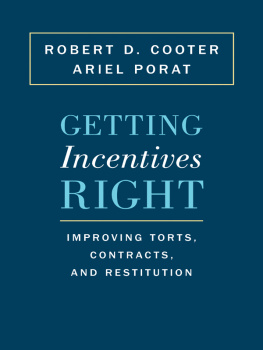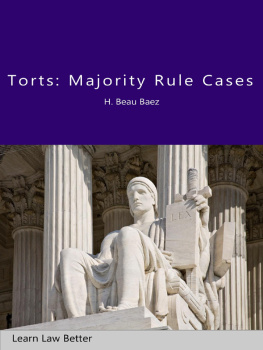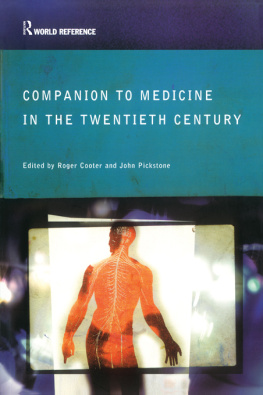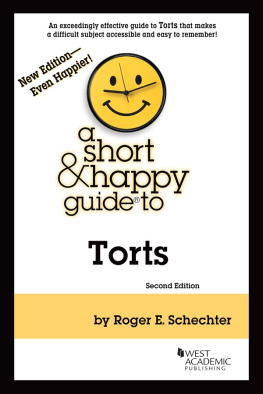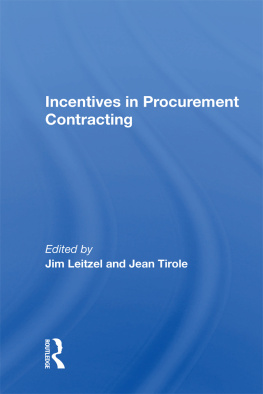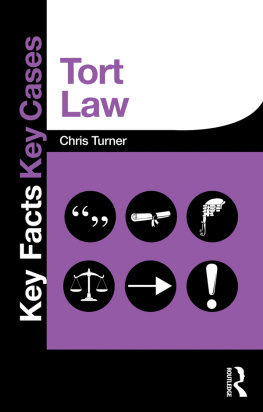Robert D. Cooter - Getting Incentives Right: Improving Torts, Contracts, and Restitution
Here you can read online Robert D. Cooter - Getting Incentives Right: Improving Torts, Contracts, and Restitution full text of the book (entire story) in english for free. Download pdf and epub, get meaning, cover and reviews about this ebook. year: 0, genre: Science. Description of the work, (preface) as well as reviews are available. Best literature library LitArk.com created for fans of good reading and offers a wide selection of genres:
Romance novel
Science fiction
Adventure
Detective
Science
History
Home and family
Prose
Art
Politics
Computer
Non-fiction
Religion
Business
Children
Humor
Choose a favorite category and find really read worthwhile books. Enjoy immersion in the world of imagination, feel the emotions of the characters or learn something new for yourself, make an fascinating discovery.
- Book:Getting Incentives Right: Improving Torts, Contracts, and Restitution
- Author:
- Genre:
- Year:0
- Rating:3 / 5
- Favourites:Add to favourites
- Your mark:
- 60
- 1
- 2
- 3
- 4
- 5
Getting Incentives Right: Improving Torts, Contracts, and Restitution: summary, description and annotation
We offer to read an annotation, description, summary or preface (depends on what the author of the book "Getting Incentives Right: Improving Torts, Contracts, and Restitution" wrote himself). If you haven't found the necessary information about the book — write in the comments, we will try to find it.
Robert D. Cooter: author's other books
Who wrote Getting Incentives Right: Improving Torts, Contracts, and Restitution? Find out the surname, the name of the author of the book and a list of all author's works by series.
Getting Incentives Right: Improving Torts, Contracts, and Restitution — read online for free the complete book (whole text) full work
Below is the text of the book, divided by pages. System saving the place of the last page read, allows you to conveniently read the book "Getting Incentives Right: Improving Torts, Contracts, and Restitution" online for free, without having to search again every time where you left off. Put a bookmark, and you can go to the page where you finished reading at any time.
Font size:
Interval:
Bookmark:
Getting Incentives Right
Improving Torts, Contracts,
and Restitution
Robert D. Cooter and Ariel Porat
PRINCETON UNIVERSITY PRESS
Princeton and Oxford
Copyright 2014 by Princeton University Press
Published by Princeton University Press, 41 William Street, Princeton, New Jersey 08540
In the United Kingdom: Princeton University Press, 6 Oxford Street, Woodstock, Oxfordshire OX20 1TW
press.princeton.edu
All Rights Reserved
Library of Congress Cataloging-in-Publication Data
Cooter, Robert.
Getting incentives right : improving torts, contracts, and restitution / Robert Cooter and Ariel Porat.
pages cmIncludes bibliographical references and index.
ISBN 978-0-691-15159-5 (hardcover : alk. paper) 1. Liability (Law)United States. 2. NegligenceUnited States. 3. TortsUnited States. 4. ContractsUnited States. 5. Compensation (Law)United States. 6. RestitutionUnited States. I. Porat, Ariel.
II. Title.
KF1250.C67 2014
346.7302dc23 2013027792
British Library Cataloging-in-Publication Data is available
This book has been composed in Minion Pro and Myriad Pro
Printed on acid-free paper.
Printed in the United States of America
10 9 8 7 6 5 4 3 2 1
Contents
Acknowledgments
M any talented people contributed to this book, like a potluck dinner for chefs. Our teachers served up the first ideas. Over the years we mixed work and pleasure with colleagues in various universities who became our friends. Many commentators who knew the original papers on which the book is based helped us to keep the best and discard the rest. Others corrected errors and clumsiness in our arguments. It is hard to know where to start and stop acknowledging them. To avoid intellectual biography, we will mention those who directly helped us with the manuscript.
We thank our colleagues Ronen Avraham, Oren Bar-Gill, Omri Ben-Shahar, Eyal Benvenisti, Hanoch Dagan, Melvin Eisenberg, Ehud Guttel, Sharon Hannes, Alon Harel, Assaf Jacob, Roy Kreitner, Saul Levmore, Eric Posner, Cathy Sharkey, Alex Stein, Lior Strahilevitz, Stephen Sugarman, Avraham Tabbach, Ernest Weinrib, and Omri Yadlin. We also thank Chuck Myers from Princeton University Press, who worked with us on the book from its very early stages. His advice contributed a lot to the books clarity and accessibility to a wide audience. Finally, we are very grateful to Vanessa Casado-Prez and Omer Yehezkel for their superb research assistance; we were lucky to have those two very talented assistants on board. Ida Ng assisted in manuscript preparation.
Several of the topics developed in this book were initially published in the following law journal articles: Robert Cooter, Prices and Sanctions , 84 C OLUMBIA L AW R EVIEW 1523 (1984); Robert Cooter & Ariel Porat, Does Risk to Oneself Increase the Care Owed to Others? Law and Economics in Conflict , 29 J OURNAL OF L EGAL S TUDIES 19 (2000); Ariel Porat, Symposium on the Restatement (Third) of Torts: Expanding Liability for Negligence Per Se , 44 W AKE F OREST L AW R EVIEW 979 (2009); Robert Cooter & Ariel Porat, Total Liability for Excessive Harm , 36 J OURNAL OF L EGAL S TUDIES 63 (2007); Robert Cooter, Unity in Tort, Contract, and Property: The Model of Precaution , 73 C ALIFORNIA L AW R EVIEW 1 (1985); Robert Cooter & Ariel Porat, Anti Insurance , 31 J OURNAL OF L EGAL S TUDIES 203 (2002); Robert Cooter & Ariel Porat, Decreasing Liability Contracts , 33 J OURNAL OF L EGAL S TUDIES 157 (2004); Ariel Porat, Private Production of Public Goods: Liability for Unrequested Benefits , 108 M ICHIGAN L AW R EVIEW 189 (2009); Robert Cooter & Ariel Porat, Liability Externalities and Mandatory Choices: Should Doctors Pay Less? , 1 T ORT L AW J OURNAL Issue 1, Article 2 (2006); Robert Cooter & Ariel Porat, Should Courts Deduct Non-Legal Sanctions from Damages? , 30 J OURNAL OF L EGAL S TUDIES 401 (2001). We hope that the ideas in the book remain crisp and enticing to you, the readers, who will judge the feast better than its cooks.
Introduction
L aw should promote the wellbeing of people. Tort law, which deals with accidents, should reduce their cost and frequencyan important matter, as accidents cause approximately 42 million hospital visits and 182 thousand deaths per year in the United States. Restitution law, which mostly discourages people from using what belongs to others without their consent, should encourage people to supply benefits for others that markets cannot provide.
In the law of torts, contracts, or restitution, the plaintiff in a suit is usually a private legal person such as a citizen or corporation, not the state as in a criminal trial. The defendant is often a private legal person as well. For these reasons, the law of torts, contracts, and restitution is called private law . By explaining how private law reduces accident costs, lubricates bargains, and encourages unrequested benefits, we will show three ways to improve the law of torts, contracts, and restitution. Before presenting our main claims, however, we briefly summarize the received economic analysis of torts, contracts, and restitution.
Tort law creates incentives for manufacturers to design safer products, injurers and victims to take precautions, insurance companies to adjust their coverage, governments to build safer roads, and so on. By imposing the cost of accidents on the parties who can best avoid them, tort law can reduce the cost of accidents to society. Unfortunately, when tort law or regulations fail to do so, much money, time, and effort spent on preventing accidents are wasted. Thus, investments in precaution are too high or too low when the negligent injurers liability does not correspond to the social harm that injurers cause. Indeed, we spend too much money reducing a few small losses, as with some industrial chemicals, but we do not spend enough reducing numerous large losses, as with kerosene space heaters.safety at no more cost. Inefficient expenditures on safety sounds like dull accounting, but it is a matter of life and death. To make the world safer without wasting money, judges, legislators, and regulators need to improve tort law.
Tort law has two pervasive rules that provide incentives for actors to reduce the cost of accidents: strict liability and negligence. Under a rule of strict liability the actor is liable for any harm caused by his behavior, as long as the victim was not negligent. Under a rule of negligence the actor is liable only for harms caused by his negligent behavioragain, assuming the victim is not negligent. Both rules can provide actors with efficient incentives to minimize social costs, but in different ways.
We begin with strict liability. Suppose an employer has to decide whether to install a safety device in the workplace to reduce risks to his employees. Assume the installation costs $9, and it reduces risks to employees by $10. A strict liability rule provides incentives for the employer to install the safety device that costs him $9 and avoids liability of $10. Installing the safety device is also socially efficient since society benefits from reducing a risk of $10 at a cost of $9.
Alternatively, suppose that the cost of installing the safety device is $11, rather than $10. A strict liability rule provides incentives for the employer not to install the safety device, since installation costs $11 and avoids liability of $10. Not installing the safety device is also socially efficient, since society suffers from reducing a risk of $10 at a cost of $11.
Interestingly, a negligence rule would provide the employer with the same incentives as a strict liability rule. Under a negligence rule, an actor is negligent and bears liability for the resulting harm if he fails to take precaution that costs less than the risk reduced by it. In the first version of our example, in which precaution costs $9 and reduces risk of $10, the employer who fails to install the safety device is negligent (9 < 10) and bears liability of $10, exactly as under a strict liability rule. As a result, he will take the precaution that efficiency requires. Conversely, in the second version of our exampleprecaution costs $11 and reduces risk of $10the employer who fails to install the safety device is not negligent (11 > 10) and bears no liability. As a result, and as efficiency requires, he will not take the precaution. So both rules provide potential injurers such as the employer with efficient incentives to minimize social costs.
Next pageFont size:
Interval:
Bookmark:
Similar books «Getting Incentives Right: Improving Torts, Contracts, and Restitution»
Look at similar books to Getting Incentives Right: Improving Torts, Contracts, and Restitution. We have selected literature similar in name and meaning in the hope of providing readers with more options to find new, interesting, not yet read works.
Discussion, reviews of the book Getting Incentives Right: Improving Torts, Contracts, and Restitution and just readers' own opinions. Leave your comments, write what you think about the work, its meaning or the main characters. Specify what exactly you liked and what you didn't like, and why you think so.

